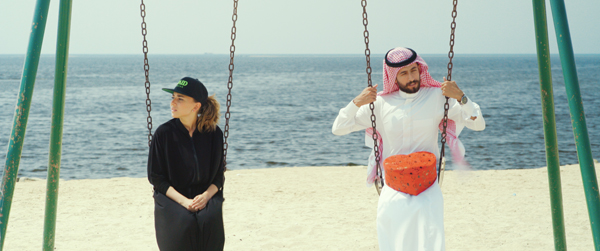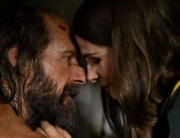Every Thursday night, Jimmy Kimmel Live! bleeps out and blurs television programming “whether it needs it or not,” in “This Week in Unnecessary Censorship,” its sendup of Federal Communications Commission standards. In doing so, it turns a show as innocuous as Sesame Street into something entirely different. Producing a similar effect, certain moments are pixelated in the amiable Barakah Meets Barakah, one of the more uncommon films to seek out at the Toronto International Film Festival. You may not be able to tell what’s going on screen, but the smeared imagery sure does make whatever is happening seem sinister and forbidden.
Ostensibly a romcon, Mahmoud Sabbagh’s debut film is one of the more pointedly political Middle Eastern films that have played the festival circuit recently, and that’s saying something. It offers an insider’s look into the particularities of Saudi social rites, especially when it comes to a lanky, shy, and naïve young man, Barakah, trying to court the beautiful, proudly Western-oriented supermodel Bibi. The good-natured satire cheekily begins with the warning that the use of pixilation is by no means a commentary on censorship. It repeats the clarification for emphasis—with a wink.
As part of his new civil service job in Jeddah, Barakah has to shut down a photo shoot (the crew has no permit), but not without the blonde model, Bibi, voicing her complaint. (Imagine her as a cousin to Elizabeth Olsen and you wouldn’t be far off). He finds out her name and about her Instagram account, where she posts pointed video protests, cautious enough not to show her face to authorities (she has a large following), and sets out to meet her. He’s also part of the artistic set, too, in a way. A go-with-the-flow kind of guy, Barakah has agreed to be part of a government-approved production of Hamlet. Since men and women are prohibited from performing together on stage, he is selected to fill in the dress for Ophelia.
The best part of the comedy focuses on the hoops Bibi and Barakah have to jump through just to see each other in person, besides the differences between an ordinary working-class stiff and an uptown girl. An encounter at an art gallery abruptly ends when the religious police arrive to inspect the show, causing Bibi to run out the back exit. In a public park, they have to keep their distance in case they’re seen. During a date in an “ethnic” food store, they pretend to shop as they have a heated conversation while pretending not to know each other.
However, there are a few broad stereotypes, such as a neighborhood busybody and Bibi’s social-climbing materialistic mother. (The latter’s haranguing, along with her pregnancy subplot, become tiring.) Nevertheless, both lead actors give sincere performances, definitely have chemistry, and are easy on the eyes. As Barakah, Hisham Fageeh has a geeky awkwardness and vulnerability that works so well in this genre. Fatima Al Banawi’s portrayal of Bibi would have been startling just a few years ago, considering the scene of her dancing alone, filming herself with her smartphone while flipping the bird to her camera; she also rarely covers her hair. Bibi joins a sisterhood of young, rebellious Arabic women that can be found in the French-Tunisian film As I Open My Eyes, which features the female gaze of a nude male, and In Between, also playing this year in Toronto.
(Director Sabbagh holds a master’s degree in documentary filmmaking from the Columbia University Graduate School of Journalism, while Fageeh, a stand-up comedian based in Jeddah, also attended Columbia and studied with the Upright Citizens Brigade Theater. Al Banawi earned a master’s degree in theological studies from Harvard University.)
Yet it’s Barakah’s recollections of the country’s not-so-distant past that makes this film a surprising submission from Saudi Arabia for the Academy Award for Best Foreign Language Film. In voice-over, the twentysomething directly laments the post-1979 crackdown of liberalism, the “over-regulation,” as he describes it, of culture and of women following the 1979 attack on the Grand Mosque by extremists, which led to the ruling House of Saud’s tightening of the Islamic code and its hold on power.
Additionally, the film’s an anomaly, given that there have been very few films made in the nation. Four years ago, another young Saudi filmmaker, Haifaa Al-Mansour, made the winsome coming-of-age tale Wadjda, about a preteen who wants to run free with the boys, largely through European financing. After Wadjda, Barakah is only the second Saudi Arabian Oscar submission ever for the foreign-film category.
That this likable film is representing the county is also notable considering there is just one public cinema in the whole kingdom. The movie will likely be available there through pirated DVDs and the Internet. However, it will be distributed throughout the Gulf region and onward in Arab markets.
But so far, it doesn’t have North American distribution, making this an ideal film to seek out at the festival this weekend.







Leave A Comment